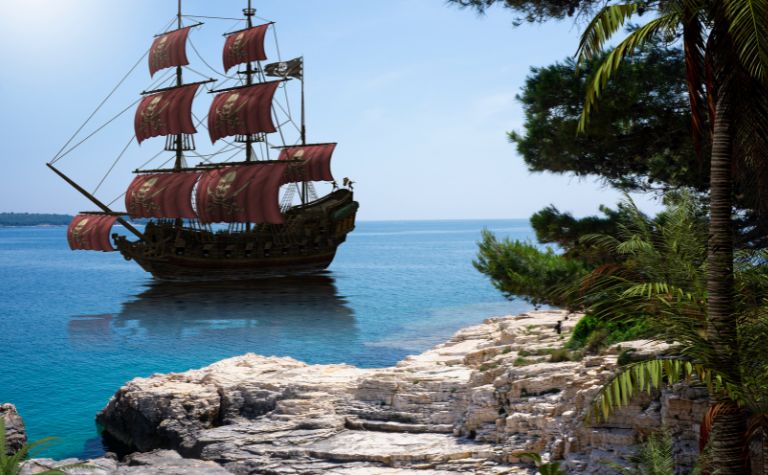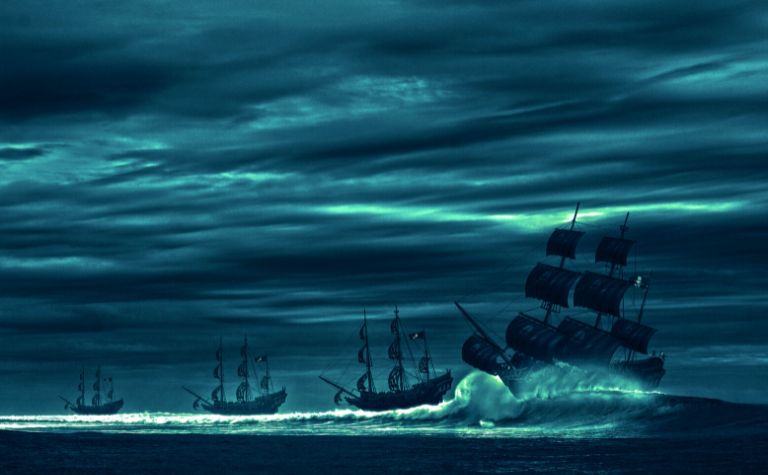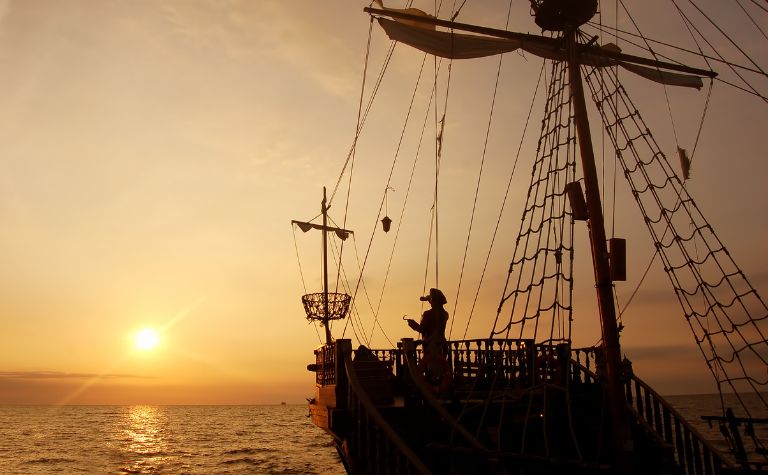The Vikings were pioneering explorers and seafarers. They traveled widely, establishing settlements and trade routes that would influence human history for centuries.
Because pillaging from other peoples was a significant part of their enterprise, they are sometimes considered no more than pirates.
Vikings were pirates based out of the various Scandinavian countries during the early Middle Ages.
While they were also traders and colonizers, the primary purpose of their travels was to pillage the wealth of other peoples.
The term Viking explicitly references this aspect of their identity.
This article will contextualize the actions of the Vikings within a larger history of piracy and explain some of the nuances in terminology between various words, such as Viking, pirate, and raiding.
Let’s get started.

What Is the Difference Between a Viking and a Pirate?
The difference between a Viking and a pirate is that all Vikings are pirates, but not all pirates are Vikings.
The term Viking refers to Norse people who were pirates in the early Middle Ages.
However, pirates existed before and after the Vikings and in many places beyond Scandinavia.
The Vikings were pirates who operated out of Scandinavia between the 8th and 11th centuries A.D.
They sailed the seas looting and plundering but also conducted trade and mercenary activity and settled and farmed lands as far away as Newfoundland in present-day Canada. [1]
Thus, while being a Viking involved many actions besides piracy, piracy was essential to being a Viking.
In fact, the term Viking derives from the Old Norse word for pirate.
However, while all Vikings were pirates, not all pirates throughout history have been Vikings.
Pirates existed before the Vikings and after them and continue to sail the seas today.
Pirates have also operated out of many countries over the years and are not exclusive to Scandinavia.
So, the two terms cannot be used interchangeably.

Where Did Pirates Come From?
Pirates came from almost every seafaring people in the history of the world.
They existed in ancient Greece and Rome operated out of Scandinavia and the Far East in the Middle Ages, and the Mediterranean and the Caribbean during the golden age of piracy.
While Vikings are some of the most famous pirates in human history, piracy has existed at various points in time in almost all the maritime communities of the world.
Both classical Greece and Rome had their share of trouble dealing with seamen willing to steal from merchant ships transporting grain and other goods. [2]
Similarly, there are explicit mentions of piracy existing in the Far East in both the medieval and early modern eras. [3] [4]
Piracy had a golden age in the 17th and 18th centuries A.D. Infamous pirates of this era include
- Edward Teach (a.k.a. Blackbeard)
- William Kidd (a.k.a. Captain Kidd)
- Henry Morgan
Their fictional counterparts are also popular, such as:
- Long John Silver
- Captain Jack Sparrow [5]
Of course, pirates have sometimes been referred to using different names.
They have also been used instrumentally–to target the ships of only enemy nations–by various states at different points in time, blurring the distinction between private profiteering and state-sanctioned quasi-military actions.
For instance, corsairs were pirates who operated along the Mediterranean Sea between the 15th and 18th centuries A.D.
This was a time when the Ottoman Empire was battling Christian European nations for dominance over the region and its shipping routes. So, corsairs often only targeted the ships of their enemies.
Muslim corsairs operating out of the North African coast raided Christian vessels, and Christian corsairs operating out of Malta struck mostly Muslim ships.
Strictly speaking, this made the corsairs a narrower type of pirate, known as a privateer.
Privateers were pirates who were authorized by the state to raid the ships of enemy nations.
The most famous of them, Francis Drake, made a fortune out of raiding Spanish merchant ships.
Drake was later knighted by the English queen, Elizabeth the First, for his nautical exploits, which included circumnavigating the globe.
By these standards, the Vikings, too, were privateers.
They exclusively attacked foreign nations and took their treasure back to their homelands with them, where they were received as returning heroes.
Buccaneers, on the other hand, were privateers who eventually turned rogue.
They operated along the Caribbean and American Pacific coast in the 17th century, targeting only Spanish ships at the behest of the governors of the Caribbean islands before turning into true pirates.
While piracy is relatively restricted and a minor problem today, it continues to be a maritime security risk and a potential cause of disruption to shipping. Notable hotspots for pirate activity include:
- Somalia
- Bangladesh
- Indonesia
- Malaysia
- Nigeria [6]

What’s the Difference Between Raiding and Piracy?
The difference between raiding and piracy is that all piracy involves raiding but all raiding need not be piracy. Piracy is always illegal, i.e., outlawed by the state.
On the other hand, raids may also be conducted legally by officially sanctioned arms of the state acting against its enemies.
The hallmark of piracy is its use of raids, backed by either the threat of violence or actual violence, to steal from passing vessels or, more rarely, coastal towns.
Other than in the case of privateers–who only targeted the properties of enemy nations–this is always an illegal activity in the nation where pirates operate.
Raids, on the other hand, may be conducted by various arms of the state seeking to act against its enemies or looking to clamp down on illegal activity. [7]
For instance, soldiers may be ordered to conduct raids on groups considered hostile to the nation. [8]
Similarly, police officers or other law enforcement officials may be sanctioned by various state authorities to conduct raids on suspected human or drug traffickers. [9]
So, while piracy always involves raids, it is also almost always illegal. Raids, on the other hand, may not always be illegal.
Today, most raids are conducted by arms of the state, such as its military and law enforcement divisions. Piracy, meanwhile, is largely restricted to a few global hotspots.
Conclusion
The Vikings were pirates of the privateer type who exclusively looted and plundered wealth from vessels, towns, and peoples other than their own.
